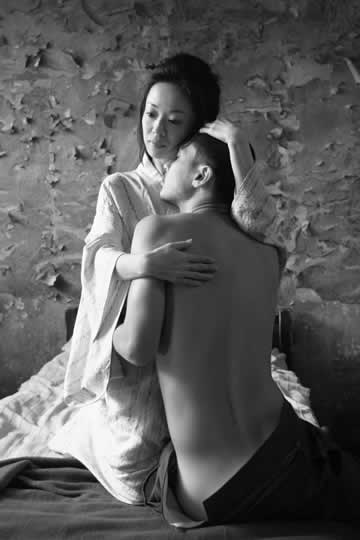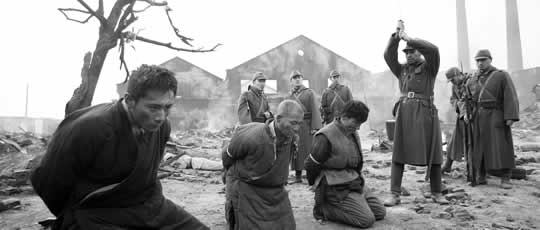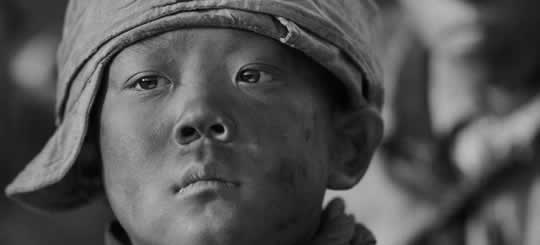 Cinema Without Borders announces Lu Chuan’s “City Of Life And Death” as one of the winners of the Bridging the Borders Award, 2011. Cinema Without Borders’s Bridging The Borders Award is awarded to films which foster understanding between different cultures and across international borders. We consider the film one of the most important films of the decade and urge our readers to see it, hopefully on the big screen.
Cinema Without Borders announces Lu Chuan’s “City Of Life And Death” as one of the winners of the Bridging the Borders Award, 2011. Cinema Without Borders’s Bridging The Borders Award is awarded to films which foster understanding between different cultures and across international borders. We consider the film one of the most important films of the decade and urge our readers to see it, hopefully on the big screen.
Due to ongoing friction between governments in the region, Lu Chuan’s brilliant war film was pulled from various International Film Festivals. This is not the first recent Chinese film about the Rape of Nanking, but it is one of the most controversial. In Japan, many influential conservatives continue to deny or attempt to minimize the massacre.
In Mainland China, “City of Life and Death” or “Nanjing! Nanjing!” was a box office hit (earning $10.2m (RMB70m) in its first five days. It was 2009’s second biggest opener (after John Woo’s Red Cliff Part II.) Some criticized the sympathetic portrayal of Kadokawa (the Japanese soldier) and demanded the film be pulled from theatres. Chinese hardliners, opposed to the policies of the liberal humanist wing of the CCP (and Premier Wen Jiabao) orchestrated a backlash, which had the effect of blocking the film from the official Chinese Huabiao Awards. The film’s many nominations were pulled from the contest a week before the awards ceremony. It was shut out from the official list of films celebrating the founding of the PRC, and from a 2009 Oscar run.
Lu Chuan’s “City Of Life And Death”, a gripping black and white war movie shows Japan’s brutal “Rape of Nanking”. This even handed ensemble piece mixes real and fictional characters: real life Nazi businessman John Rabe (John Paisley), whose “safety zone” saved countless refugees until he was recalled to Germany, his secretary Tang (comic Fan Wei) who turns traitor in a vain attempt to save his family, teacher Miss Jiang (Gao Yuanyuan) devoted to saving the safety zone refugees, the Chinese resistance fighter Lu Jianxiong (Ye Liu), a band of rebels, the war-wise child soldier Xiaodouzi (Bin Liu), the monstrous Japanese Commander (Kohata) and an idealistic Japanese soldier Kadokawa (Hideo Nakaizumi) in love with a “pleasure woman”, whose repelled by the atrocities, but too indoctrinated to resist. Close-ups of Kadokawa’s shell-shocked face turn him from an invader into the audience’s proxy. We might be him, following orders into a historic nightmare, stumbling from one horrific moment to the next.
Lu Chuan (“Mountain Patrol: Kekexili,”) is a director of muscular visual gifts, able to telescope from the intimate to the epic, from the human to the inhuman in one camera move. His eloquent, near silent script drew many details from Iris Chang’s 1997 “Rape of Nanking: The Forgotten Holocaust of World War II,” filled with accounts from survivors. Lu Chuan uses tourist postcards sent home by Japanese soldiers, to bridge the series of massacres that that left 250,000 dead in six weeks.
 The Japanese breach Nanking’s historic walls. Refugees stream through the streets. Rag tag groups of Chinese defenders snipe at the invading troops in the half leveled city. Lu Chuan’ cuts from one episode of the bloody massacre to next with operatic intensity. Images, as visceral as wartime German expressionist art, pepper the larger set pieces. Severed heads swing upside down from a tree, bodies of naked prostitutes are stacked like fruit, one woman’s body is tossed on the ground like an empty bottle. Victorious Japanese soldiers, ordered to bury some Chinese soldiers alive, stamp down the earth around the victims heads like peasants planting seeds. Lu Chuan’s a master at choreographing action sequences. Like Kurosawa or Scorcese, he manages to personalize characters in the midst of the most chaotic violence. Scenes of the brutal use of women during wartime have never been more graphic or revelatory than in this film. Rape, sacrifice, even tender moments, (as between Kadokawa and his Japanese pleasure woman) or the poignant
The Japanese breach Nanking’s historic walls. Refugees stream through the streets. Rag tag groups of Chinese defenders snipe at the invading troops in the half leveled city. Lu Chuan’ cuts from one episode of the bloody massacre to next with operatic intensity. Images, as visceral as wartime German expressionist art, pepper the larger set pieces. Severed heads swing upside down from a tree, bodies of naked prostitutes are stacked like fruit, one woman’s body is tossed on the ground like an empty bottle. Victorious Japanese soldiers, ordered to bury some Chinese soldiers alive, stamp down the earth around the victims heads like peasants planting seeds. Lu Chuan’s a master at choreographing action sequences. Like Kurosawa or Scorcese, he manages to personalize characters in the midst of the most chaotic violence. Scenes of the brutal use of women during wartime have never been more graphic or revelatory than in this film. Rape, sacrifice, even tender moments, (as between Kadokawa and his Japanese pleasure woman) or the poignant sacrifice of a rebellious young prostitute Xiao Jiang (Yiyan Jiang) to save others in the Zone
sacrifice of a rebellious young prostitute Xiao Jiang (Yiyan Jiang) to save others in the Zone
Cao Yu’s supple widescreen hand-held camerawork recalls “The Cranes Are Flying” in its capacity to render epic scenes intimate. Hao Yi’s sets of destruction recall Rossellini’s “Germany Year Zero ” or Vadja’s war trilogy. Liu Tong’s dynamic music, incorporating unnerving silent stretches, underscores brilliant set-pieces: the group surrender in the church, an epic battle sequence, a mass execution, safety zone refugees volunteering as “Pleasure-women” to save the rest, all mixed with the banal. As the Japanese troops practice a dance for their victory ceremony, It’s barbarism and black comedy at once. An indelible masterpiece of emotional and technical bravura that MUST be seen on the big screen, Lu Chuan’s existential portrait of complicity and heroism forged in the realm of unspeakable fear, draws the audience into the madness of war. Opens NUART June 17

